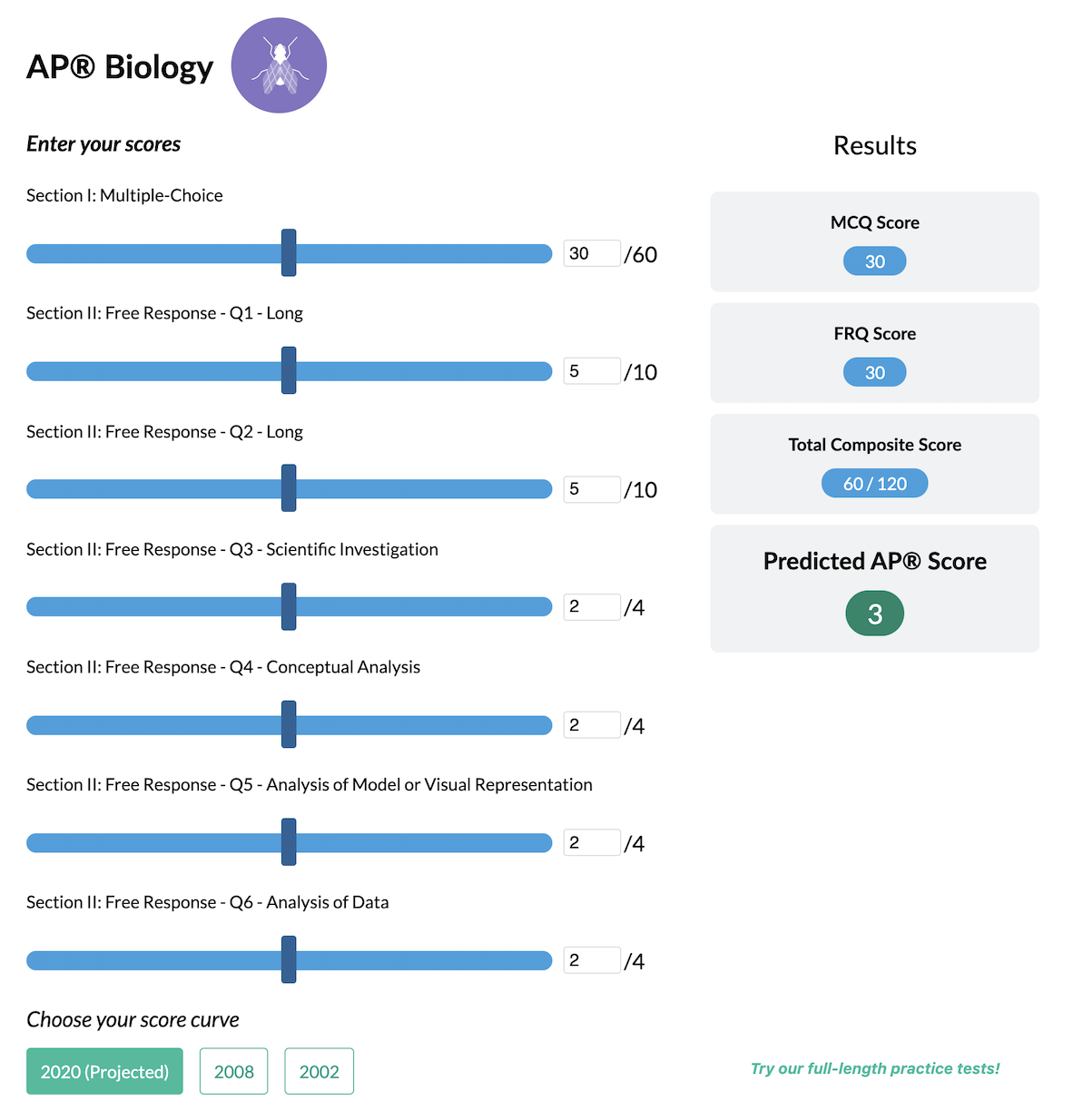What We Review
Is AP® Biology easy? What can make it hard?
The AP® Biology exam is hard when compared to a typical high school-level biology course exam. The AP® course exams are designed to measure a higher level of content understanding and require you to analyze and apply that knowledge; all of this is typically taught at the college level.
If you compare the AP® Biology exam to other AP® exams, the AP® Biology exam is slightly easier to pass than other AP® course exams for the following reasons.
In 2024, about 68.3% of the 260,062 students who took the AP® Biology exam scored a 3 or higher (according to this data from College Board).
When viewed in comparison to the other exams in the AP® Sciences category, the AP® Biology exam is about average in terms of passing rate. Three of the seven exams in the group had a pass rate higher in 2021 than the AP® Biology exam, and three had a lower passing rate.
However, three exams with a higher passing rate (Physics 2, Physics C-Mechanics, and Physics C-Electricity and Magnetism) generally have a much smaller group of total test takers. Since these exams accompany advanced Physics, they tend to weed out many potential test takers.
Since 2017, the passing rate for the AP® Biology exam has remained relatively steady. In 2021, the passing rate was 59.2%, and in 2022, it rose slightly to 67.9%. In 2023, the passing rate for the AP® Biology settled back to 64.4%.
The AP® Biology exam is generally one of the most popular AP® exams in the Sciences category.
How are AP® Biology scores calculated?
Even though the AP® Biology exam has a higher-than-average passing rate, it could still be useful to go into the exam knowing how many points you need in each section to pass.
Our AP® Biology score calculator clearly shows that you would need to answer 50% of the multiple choice questions right and get at least half of the points for each free response question to achieve a score of 3 or better on this exam.

Return to the Table of Contents
Is AP® Biology worth it?
Many students feel that taking the AP® Biology exam is worth it. Primarily, AP® courses help students understand the increased difficulty and faster pace that is required in college courses. Doing well in an AP® course can also help build your academic confidence.
If college is your goal, taking AP® courses can really aid in the admissions process. When admissions counselors see AP® courses on a student’s transcript, it shows them that the student is prepared to succeed in college-level courses. According to College Board research, “students who receive a score of 3 or higher on AP® Exams typically experience greater academic success in college and have higher graduation rates than their non-AP® peers.”
Many parents will also be interested in the potential for savings that taking AP® exams can provide. When students graduate from high school with college credits, they eliminate the need to take those courses in college, saving valuable tuition money.
The chart below provides a glimpse into a few of the colleges that accept AP® Biology for college credit.
School | Minimum Score Required | Number of Credits |
| Columbia University | 5 | 3 |
New York University | 4 | 8 |
University of Michigan | 3 | 4 |
University of Florida | 3-5 | 4-8 |
San Diego State University | 3 | 6 |
University of Houston | 3 | 8 |
Carnegie Mellon University | 4-5 | 9 |
Arizona State University | 3-4 | 4-8 |
Given that the average cost per credit hour ranges anywhere from $406 (for in-state residents at a public 4-year college) and up to $1,469 (for a private 4-year university) or greater, this can result in a savings of at least $1,218 to nearly $4,000. As you can see, the academic benefits combined with the financial benefits make taking the AP® Biology exam worth your time and effort.
When is the 2025 AP® Biology exam?
The 2025 AP® Biology exam will take place on Monday, May 5, 2025, at 8am Local Time
Curious about when other AP® exams are happening in 2025? View the complete 2025 AP® exam schedule here.
When do AP® Biology scores typically come out?
According to the latest update from the College Board exam season timeline, students will receive their AP® scores in July 2025. Historically, the College Board typically releases AP® scores early in July. AP® scores are almost always available in July.
You’ll be able to access your AP® scores online with your College Board account username and password.
How is AP® Biology scored? What’s the weighting of different questions?
The chart below outlines the scoring breakdown for the AP® Biology exam:
Section | Questions | Time | % of Exam Score |
1: Multiple Choice | 60 questions | 1 hour and 30 minutes | 50% |
2: Free Response | 6 questions | 1 hour and 30 minutes | 50% |
Section 2 consists of two long free-response questions, both focusing on the interpretation and evaluation of experimental results. One of these questions will require graphing in your response. The other four questions in Section 2 are short-answer questions that will cover the areas of scientific investigation, conceptual analysis, analysis of a model or a visual representation, and analysis of data.
Reminder: Improper or incomplete graphing can cost you points. Be sure to brush up on graphing best practices prior to the exam.
The units covered in the AP® Biology course are weighted in the exam as follows:
Units | Exam Weighting |
Unit 1: Chemistry of Life | 8-11% |
Unit 2: Cell Structure and Function | 10-13% |
Unit 3: Cellular Energetics | 12-16% |
Unit 4: Cell Communication and Cell Cycle | 10-15% |
Unit 5: Heredity | 8-11% |
Unit 6: Gene Expression and Regulation | 12-16% |
Unit 7: Natural Selection | 13-20% |
Unit 8: Ecology | 10-15% |
What happens if you fail AP® Biology?
Failing the AP® Biology exam is not the end of the world! This exam is given every year, and you have the option to retake the exam as often as you like. You can retake it if you’ve failed the exam in the past or if you passed but would like to try for a higher score.
Of course, each exam will be different, and it is recommended that you study for your retake exam as hard or harder than you studied for your first AP® Biology exam.
There is little need to worry about the impact of failing the AP® Biology exam on your high school GPA. Most schools don’t factor the AP® Biology exam score into your course grade, instead focusing on your coursework and course tests. If you’ve maintained high scores in your AP® Biology course, failing the exam will not affect that grade.
Colleges will typically only award college credit to students who score at least a 3 or 4 on the AP® Biology exam. If you failed or scored lower than a 3, you will need to retake the AP® Biology exam in order to be awarded college credit.
You can also negate any effects a failing score would have on your college admissions chances by choosing not to send low scores to certain colleges. You are in control of which colleges receive your AP® exam scores. In addition, if you did send a low score to a college and then score higher on your retake, you can have the college replace your lower score with your higher score.
When do students typically take AP® Biology? When is best?
The timing of when to take the AP® Biology exam varies somewhat depending on your high school’s requirements. In some schools, AP® Biology is open to sophomores, and in others, students must wait until their junior or senior year. It is rare for students to take AP® Biology in their freshman year.
Some students take regular biology their freshman year and AP® Biology their sophomore year. For science-minded students who want to take several AP® science courses in their high school career, the timing can change to AP® Chemistry in the freshman year and AP® Biology in the sophomore year. Many students take regular biology and chemistry to start high school and then take AP® Biology in their junior or senior years.
Taking regular Biology prior to AP® Biology gives students an introduction to the course content at a more reasonable pace and with a discussion of a wider range of topics in the area of biology. This schedule would allow you to take AP® Biology with a solid base in biology, as the AP® course will cover more specific content than the general high school biology course.
Your science aptitude and level of interest in the subject will be the primary drivers in deciding when to take AP® Biology. You should consult with your teachers, guidance counselor, and parents to make the decision of when to take AP® Biology.
Where can I find past AP® Biology exams?
Past AP® Biology exams are available on the College Board’s AP® Central website.
In addition to past exams, the College Board has also made available practice tests for the last five years worth of exams to allow you to get accustomed to the types of questions that have been found on past exams.
The practice tests for AP® Biology can be found at the links below:
- 2024 AP® Biology Free-Response Questions
- 2023 AP® Biology Free-Response Questions
- 2022 AP® Biology Free-Response Questions
- 2021 AP® Biology Free-Response Questions
- 2019 AP® Biology Free-Response Questions
- 2018 AP® Biology Free-Response Questions
- 2017 AP® Biology Free-Response Questions
- 2016 AP® Biology Free-Response Questions
- 2015 AP® Biology Free-Response Questions
Practice questions for the multiple-choice portion of the exam and all relevant academic standards can be found in the AP® Biology Course and Exam Description. However, that document only contains 15 MCQs and a few FRQs, so it will not mirror the depth of knowledge covered in the actual exam. It will, however, provide you with some understanding of what to expect on this section of the AP® Biology exam.
If you would like to get more comprehensive practice on the multiple-choice section of the exam, Albert provides you with access to hundreds of multiple-choice practice questions that are designed to mimic the units covered by and learning objectives required from the AP® Biology exam.
The College Board’s AP® Central website also provides other useful resources that can aid you in boosting your AP® Biology exam score. The most recent resources they offer include:
- AP® Biology Scoring Guidelines 2024 / 2023 / 2019 / 2018 / 2017 / 2016
- AP® Biology Chief Reader Reports 2024 / 2023 / 2019 / 2018 / 2017 / 2016
- AP® Biology Scoring Reports 2024 / 2023 / 2019 / 2018 / 2017 / 2016
The scoring guidelines for the AP® Biology exam can be handy for learning how points are meted out for each short answer question.
Understanding the point allocations is important for the short answer questions since this section is graded much more subjectively than the multiple-choice section. These scoring guidelines will give you details on which questions were awarded full or partial credit on past exams.
Each AP® exam has a Chief Reader who puts out a report analyzing the successful and unsuccessful short answer and essay questions each year. This report outlines past responses against the expectations for each question and highlights the elements that were included in the successful answers.
For example, the 2019 Chief Reader Report for AP® Biology revealed that students struggled with properly graphing data. They stressed that those who can interpret data on a graph might not automatically be good at creating a graph, so that skill should be practiced.
The AP® Biology Scoring Report allows students to view which questions were missed most often by past exam takers and those most often answered correctly.
For example, the mean score for question #7 was 0.88 out of a possible 3 points. This question required students to identify information from a data table, describe cellular processes, and explain an experimental result. According to the Chief Reader, many students were not specific enough to explain why gene G was expressed in every tissue type.
After reviewing the Scoring Guidelines, Chief Reader Reports, and Scoring Reports, students should also familiarize themselves with the sample responses for the AP® Biology exam. These reports provide you with three different responses to free-response questions. One response received full credit at 4 points, one received partial credit at 3 points, and one received only 2 points.
The AP® Central AP® Biology exam page provides students with a significant amount of useful information and insight into the short answer and essay portions of the AP® Biology exam. However, it is important to remember that 50% of your exam grade comes from the multiple choice portion of the exam. Your ability to answer the multiple choice exam questions correctly will significantly aid in achieving the highest score possible on the AP® Biology exam.
You can find thousands of multiple-choice practice questions on the Albert website. These questions have been carefully aligned with the learning goals and content covered in the most recent AP® Biology exam. In addition to the answers, Albert also includes a detailed explanation of each exam question.
Who should take AP® Biology? What sort of students may like it more than others?
If you enjoy science and such topics as evolution, genetics, and cellular processes, AP® Biology could be a good choice for you. In addition to your academic interests, you should also factor in your past academic performance in science classes to determine if this subject fits your academic strengths. You can consult the course overview for more information.
AP® Biology is not a required course, so not taking it will not impact your ability to graduate. If the course does not align with your academic abilities or interests, you should pass on it and choose a course that is better suited to you.
However, taking AP® Biology could be a good choice if you plan on majoring in any science in college. Beyond the fact that it could provide you with college credit, it will also allow you to understand better what your college science courses will be like. Another benefit of taking AP® Biology is that it can aid in the college admissions process, especially for colleges that are highly competitive.
If your academic goals include achieving 5s on all of your AP® exams, you’ll want to approach AP® Biology cautiously. The AP® Biology exam awards a very low percentage of 5s each year. In 2019, only 7.2% of the test takers received a 5 on the AP® Biology exam.
Compared to other AP® science courses, the number of perfect scores awarded in AP® Biology is the second lowest. AP® Physics 1 was slightly lower, with a 2019 percentage of 7.1% of test takers achieving a perfect score.
In the end, you should choose AP® courses based on what interests you and in which subjects you think you could excel. The choice is ultimately up to you, but you should get opinions from your guidance counselor and parents, as they can provide valuable insight.
How do students typically score on AP® Biology? What’s the score distribution?
There are a variety of factors that determine who well students score on the AP® Biology exam. These factors include how well prepared the student is and their aptitude for the subject. However, past data can help in determining the overall performance of the test takers in past exam years. This data can be used to draw some basic conclusions about overall performance on this exam as a group.
This table shows the score distributions for the past three years on the AP® Biology exam:
Year | % of 5s | % of 4s | % of 3s | % of 2s | % of 1s | Pass Rate % |
| 2024 | 16.8% | 23.1% | 28.4% | 21.7% | 10.0% | 68.3% |
| 2023 | 14.3% | 23% | 27.2% | 23.6% | 12% | 64.4% |
| 2022 | 15.0% | 23.1% | 29.7% | 21.6% | 10.5% | 67.9% |
| 2021 | 7.4% | 19.4% | 32.4% | 30.0% | 10.8% | 59.2% |
2019 | 7.2% | 22.2% | 35.3% | 26.6% | 8.8% | 64.7% |
2018 | 7.3% | 21.6% | 32.8% | 28.3% | 10.2% | 61.5% |
2017 | 6.4% | 21.0% | 36.7% | 27.5% | 8.4% | 64.1% |
For the last few years, the AP® Biology exam has held a steady passing rate of near or over 60%. The pass rate from the 2024 exam was the highest in many years!
Test-takers in the top ~30% typically received a 4 of 5 on this exam, with 10-15% receiving the maximum score of 5.
The 2024 AP® Biology exam yielded a mean score of 3.15.
Need help preparing for your AP® Biology exam?

Albert has hundreds of AP® Biology practice questions, free responses, and full-length practice tests to try out.








